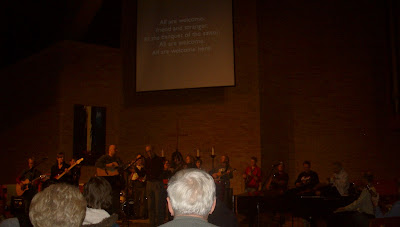
My many hats collided this weekend to make for a fun, yet exhausting, jam-packed 48 hours. Musicians as a general rule get the privilege of forging out a career by working a lot of different jobs, rather than one. I am not unique in this difficult yet rewarding balancing act.
Why do you think I do this to myself? I have a hard time saying no. I admit it. I loved each of the single events I attended, but when you add them all up, it was sort of crazy. Add to the mix that I want to be a good daughter to aging parents, a responsible parent to teens, a wife, don't forget wife!, friend, and the music events were over-the-top important.
I found some time to practice over the weekend with my daughter, who performed a clarinet piece in the high school solo and ensemble festival today. It's so much fun to play with her, and there's only one more year to do this together. I wasn't going to miss this fast-disappearing opportunity.
There was a concert on Friday night which brought together 10 bands of Lutheran song writers. They each showcased 2-3 of their songs. It was a long night, over three hours, but one band in particular made it all worthwhile. I have been playing their music over a decade and this was the first time I met them. I even got the lead songwriter's autograph for a friend! They were terrific. The whole event was humbling really. The room was so full of talented musicians. Many levels of performance leadership to observe, as well as soundboard and acoustics, and what the audience enjoyed. I am so glad I went.
Saturday, I got to do some judging. Now usually the day is 8-3, or 9-3:30 with a nice bunch of breaks, and about 45-50 students at 10 minute intervals. It's not rushed or lengthy, but this year it was 8-5, and 60 students. My hand was so tired, each critique is 3/4 of a page to write. My ears got tired too, if you know what I mean. I felt bad that the last of the students was not getting the same critical listener that the first half of the day received. I let the chair know that I couldn't do that size day again. I hope they ask me again; I like to hear the students, and I believe I have something to say to them. I agreed to do this judging over a year ago, no way to get out of it.
But I believe that the biggest "event" of the weekend was the special music at worship on Sunday. It was only a two minute piece, but I sweated it the most! I play keys and lead the band at a mission church. We were studying Matthew 6. During the planning, I sent an email link of the Bob Marley song, "Three Little Birds" to the pastor and said, "What about this for the Special music during the Offering. Just kidding (sort of, it even talks about the 3 little birds!)" Well, poof, we learned it, reggae and all, although we're a bunch of white kids!
It was made all the more difficult when the drummer didn't come to practice. I have this huge problem that I want everything I'm involved in to go really well. It's chronic. It's a burden, and I can't help it. But how do you say "hey - where were you to practice this?" when it's church? All are welcome, all gifts accepted. There is such tension in this for me. I'm living in it, I'm workin' it out, no worries, but woah, it's so hard some days.










